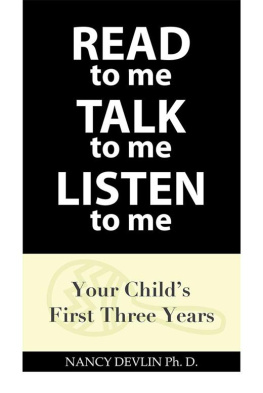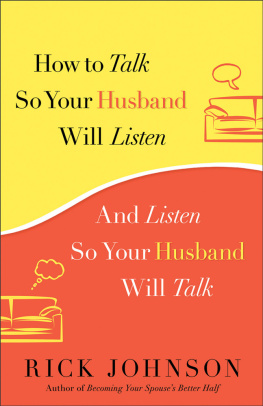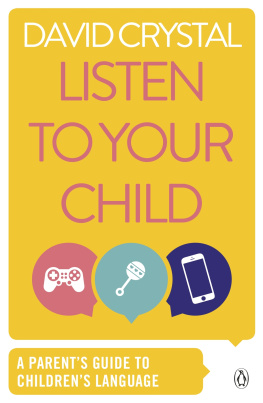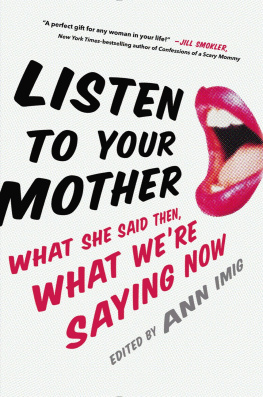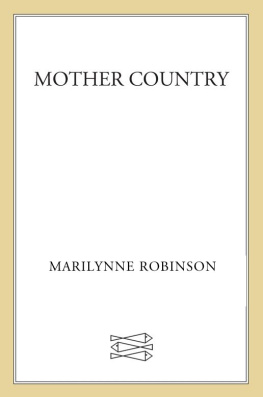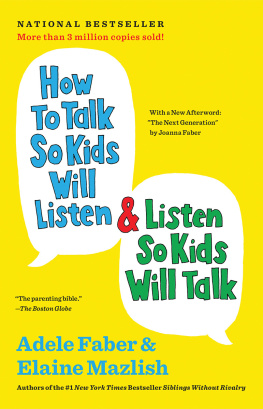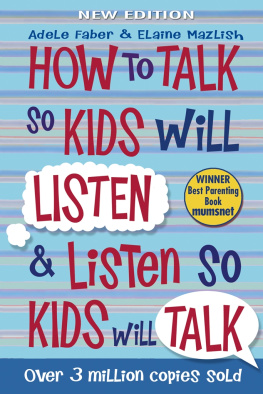Nancy Devlin Ph.D. - Read to Me Talk to Me Listen to Me: Your Childs First Three Years
Here you can read online Nancy Devlin Ph.D. - Read to Me Talk to Me Listen to Me: Your Childs First Three Years full text of the book (entire story) in english for free. Download pdf and epub, get meaning, cover and reviews about this ebook. year: 2015, publisher: AuthorHouse, genre: Children. Description of the work, (preface) as well as reviews are available. Best literature library LitArk.com created for fans of good reading and offers a wide selection of genres:
Romance novel
Science fiction
Adventure
Detective
Science
History
Home and family
Prose
Art
Politics
Computer
Non-fiction
Religion
Business
Children
Humor
Choose a favorite category and find really read worthwhile books. Enjoy immersion in the world of imagination, feel the emotions of the characters or learn something new for yourself, make an fascinating discovery.
- Book:Read to Me Talk to Me Listen to Me: Your Childs First Three Years
- Author:
- Publisher:AuthorHouse
- Genre:
- Year:2015
- Rating:4 / 5
- Favourites:Add to favourites
- Your mark:
- 80
- 1
- 2
- 3
- 4
- 5
Read to Me Talk to Me Listen to Me: Your Childs First Three Years: summary, description and annotation
We offer to read an annotation, description, summary or preface (depends on what the author of the book "Read to Me Talk to Me Listen to Me: Your Childs First Three Years" wrote himself). If you haven't found the necessary information about the book — write in the comments, we will try to find it.
Read to Me Talk to Me Listen to Me: Your Childs First Three Years — read online for free the complete book (whole text) full work
Below is the text of the book, divided by pages. System saving the place of the last page read, allows you to conveniently read the book "Read to Me Talk to Me Listen to Me: Your Childs First Three Years" online for free, without having to search again every time where you left off. Put a bookmark, and you can go to the page where you finished reading at any time.
Font size:
Interval:
Bookmark:
READ
to me
TALK
to me
LISTEN
to me
Your Childs
First Three Years
NANCY DEVLIN, PH.D.

AuthorHouse
1663 Liberty Drive
Bloomington, IN 47403
www.authorhouse.com
Phone: 1 (800) 839-8640
2015 Nancy Devlin, Ph.D. All rights reserved.
No part of this book may be reproduced, stored in a retrieval system, or transmitted by any means without the written permission of the author.
Published by AuthorHouse 08/04/2015
ISBN: 978-1-5049-2333-0 (sc)
ISBN: 978-1-5049-2332-3 (e)
Any people depicted in stock imagery provided by Thinkstock are models,
and such images are being used for illustrative purposes only.
Certain stock imagery Thinkstock.
Because of the dynamic nature of the Internet, any web addresses or links contained in this book may have changed since publication and may no longer be valid. The views expressed in this work are solely those of the author and do not necessarily reflect the views of the publisher, and the publisher hereby disclaims any responsibility for them.
Contents
1
Introduction
We know the country has a problem when a woman says: I dont work. Im just a stay-at-home mother. Or even, Im just a housewife. These words are said humbly and apologetically in answer to the question, What do you do?
Just a mother is the highest calling one can have. The problem is that no one believes this: not the mother, not the workplace and not the government.
We know the mother does not believe it because even before the baby is born, plans have been made for somebody else to take care of him. This, in spite of the fact that all of the studies unequivocally find that what is best for the baby is for his mother to nurture and if possible to breast feed him for at least the first six months.
We know that the workplace does not believe this because a law had to be passed before employers would give mothers the right to stay home in order to nurture their new babies. The Family and Medical Leave Act allows mothers to take up to twelve unpaid weeks off, without risking their jobs, to care for the newborn baby. Many employers do not inform their employees of their rights under this law nor do they post the notice as required by law.
Even when informed, many women do not take advantage of the law because they fear it will affect their careers and future earnings if they take off six months, let alone three years to raise their child. This, in spite of the fact that women live longer and will be in the work force longer. Three years seems a short time to take out of a career that can span over thirty or forty years.
We know that the government does not believe this because it is willing to subsidize day care but not mother care. In the case of the welfare mother, it is making it impossible for her to stay home with her new baby. The government, in compiling its statistics, does not acknowledge the productive work of the mother and her contribution to the economy since what she contributes is unremunerated. Only paid work is recognized and recorded. In case the men who originate these rules and develop these statistics have not noticed, motherhood IS work.
Day care, no matter how well done, is no substitute for the parent. The mother is critical for the first six months and essential for the first three years.
A mother knows her baby best. The baby thrives with the mother who smothers him with love and who is always there for him. A baby needs one-to-one attention and has difficulty relating to the many, often unfamiliar, adults he encounters in day care. In order to thrive, babies need permanence, continuity, passion and commitment. A mother has these qualities in abundance. Let us all strive to help her to do her job and to be what the world needs most --just a mother.
2
Politicians
Many candidates for president do not seem to have a good education agenda. This could be because they know too little about the topic to have any agenda. The following is an attempt to educate them for the future.
Of all creatures, humans at birth are the least equipped with innate mechanisms needed for survival. Their brains are not fully developed. This makes them amazingly adaptable but exceedingly vulnerable requiring a huge investment by the adults who care for them.
It also forces each baby to go through the process of development, which can only be done by acting on and reacting to the environment. Babies, when stimulated, rapidly learn to influence their environment, to adapt it to themselves and to learn about it by exploring it. Every baby needs to experience this in order for the brain to develop and for learning to take place.
The basic building blocks for the babys future development are laid from birth to age three because of the plasticity of the brain at these ages. If the brain is not stimulated during that time, as one researcher put it, the windows of opportunity are permanently closed. Age three or five, when children go to school, is too late. Children who have not been stimulated are already at a disadvantage and may never catch up.
Babies who began life ready to explore and to live the great adventure are easily defeated by adults who discourage their inquisitiveness and who do not express joy in each new achievement. These babies eventually give up and become lackadaisical. Some babies are left in playpens with bottles in their mouths and the television on for long periods of time by caretakers who are overwhelmed.
Politicians, instead of making educational policies about getting tough with students and the educational establishment, (which is like closing the barn door after the horses have escaped) should be making policies about prevention. The damage has been done before the child comes to school.
Get-tough pronouncements that demand that welfare mothers go to work forces them to depend on day care. These women are taken out of their homes and away from their children with little to show for it because of the high cost of this day care. Instead of these get-tough policies, politicians would be doing the babies a favor by setting up a program to educate the mothers so that they have the opportunity to provide the stimulating environment the babies so desperately need.
Instead of punishing welfare mothers by forcing them out of the home, a system should be developed whereby welfare mothers could stay home and still get their benefits. All politicians need to understand child development if they are going to make decisions that affect the welfare of the family. They need to understand that many children are not succeeding in school because their windows of opportunity for intellectual, physical, social and emotional growth were closed long before they arrived at the school door.
Politicians of good faith, please remember the children. They are our only hope for the future.
3
Motherhood as a Profession
Being an at-home mother especially during a babys first three years of life has to be raised to the status of a profession like doctor, lawyer and teacher. As in any profession, in order to be licensed to practice, one has to finish a course of study and to complete an internship. After successfully completing training and entering the child-rearing profession, a mother, like every other professional, would receive a salary commensurate with her training and experience.
Sound far fetched? Maybe not. Maybe something as dramatic as giving motherhood the best the country has to give in terms of money, education, support and prestige is the only thing that is going to save our neglected children and ensure a brighter future for our country. In our status-conscious society, motherhood is about as low as you can get. At the top are athletes, movie stars, and other celebrities, who contribute little if anything to the countrys well-being.
Next pageFont size:
Interval:
Bookmark:
Similar books «Read to Me Talk to Me Listen to Me: Your Childs First Three Years»
Look at similar books to Read to Me Talk to Me Listen to Me: Your Childs First Three Years. We have selected literature similar in name and meaning in the hope of providing readers with more options to find new, interesting, not yet read works.
Discussion, reviews of the book Read to Me Talk to Me Listen to Me: Your Childs First Three Years and just readers' own opinions. Leave your comments, write what you think about the work, its meaning or the main characters. Specify what exactly you liked and what you didn't like, and why you think so.

